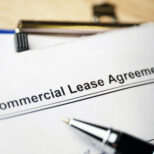
Redevelopment of commercial property around your tenant
8th June 2022 by Claire Taylor
Redevelopment of parts of a building in your portfolio, to create a more flexible layout or perhaps add additional floors, can be a good way to enhance investment value. This is easiest in a vacant building, but you may have good tenants and want to preserve your income stream. If so, you must take the needs of your tenants into account when you are designing your development scheme so that you do not unfairly interfere with their rights under their leases.
‘If a landlord has plans to improve or extend a building, the last thing they want is to be stopped in their tracks by an injunction from an angry tenant,’ says Claire Taylor in the commercial property team with Laceys Solicitors. ‘A dispute with an existing tenant will not only add delay and expense to a project but it could also damage the landlord and tenant relationship in the long term.’
To make sure this does not happen, it is vital to get early advice from your solicitor about your plans and how best to reduce the impact on your tenants.
Rights to redevelop
If you want to carry out any redevelopment work which is likely to affect your tenants’ businesses, the first thing your solicitor will do is check to see what rights the lease gives you. Commercial leases often say expressly that the landlord has the right to carry out redevelopment works in other parts of the building, or on neighbouring land or buildings owned by the landlord, even if that interferes with tenants. The lease may refer specifically to things like scaffolding and interference with the usual access routes and levels of light. Rights like this are a good starting point, but they do not mean that you can carry out every type of works regardless of the impact on your tenants.
Express redevelopment rights may be limited by safeguards which a tenant’s solicitor negotiated when the lease was granted. The landlord may have an obligation to keep any adverse impact on the tenant’s business to a minimum but a wide clause like this is open to interpretation, which is how landlords and tenants often get into a dispute.
The other key aspect of the lease is the landlord’s covenant to allow the tenant ‘quiet enjoyment’. In recent court decisions about whether development work by landlords was causing unreasonable interference with their tenants’ businesses, the covenant for quiet enjoyment has been the tenants’ trump card.
Quiet enjoyment
A commercial lease will almost always contain an express quiet enjoyment covenant. In the rare cases where it is not set out in the lease, it is implied by law. Quiet enjoyment means that the landlord must not do anything to prevent the tenant occupying and using the premises for the use permitted by the lease. Where the lease reserves rights to redevelop, they must be read together with the quiet enjoyment covenant. The practical outcome is that even if there are express rights to carry out works, the landlord must take all reasonable steps to minimise disruption to tenants.
If you are planning works, you should think widely about how they might affect your tenants. The impact of scaffolding, hoardings and noisy works are obvious, but you should also consider things like access.
You should also consider the nature of your tenants’ business. There have been high profile court cases involving luxury car showrooms and art galleries, where disruptive work was a significant deterrent to customers. If you have retail tenants, works that require adjacent footways to be closed could adversely affect the tenants’ business by reducing footfall to their premises, even if your works do not otherwise affect them.
Disputes over quiet enjoyment and interference can arise in relation to open land as well as commercial buildings if a tenant uses that land for the purposes of a business. One of the recent cases involved farmland and whether the landlord was entitled to enter to dig boreholes and carry out surveys in preparation for a larger development.
Negotiation
If you end up in a dispute you will need legal advice to help settle it, so it is better for everyone to avoid getting into this situation. Clear communication with your tenants from the very beginning is the best strategy and your solicitor can negotiate with your tenants’ representatives. To give yourself the best chance of your project going smoothly, there are some key points to think about:
- Make sure your tenants know exactly what you are planning to do and how you will protect them from unreasonable interference. You may need to agree a method statement for how the works will be carried out and a clear programme, so the tenants know what to expect and when.
- Consider whether you can time the works to cause less disruption. Retail tenants will not want to have access or visibility reduced during key trading periods like Christmas and Easter.
- If you need to erect scaffolding or hoarding, think about how you can offer your tenants visibility, with signage and obvious access routes.
- If you are not able to carry out your intended works without significant disruption to tenants, you may need to offer them rent reductions for an agreed period or even arrange for them to move temporarily to alternative premises. It is important to document this sort of arrangement properly, and this is something your solicitor can advise on.
How we can help
A development project that goes smoothly can enhance the building for both landlord and tenants. Good legal advice from the outset will enable you to work within the rights reserved by the lease and keep tenants engaged and informed. This will give you the best chance of completing the redevelopment without running into unexpected disputes and costs.
For further information, please contact Claire Taylor on 01202 377800 or email c.taylor@laceyssolicitors.co.uk



